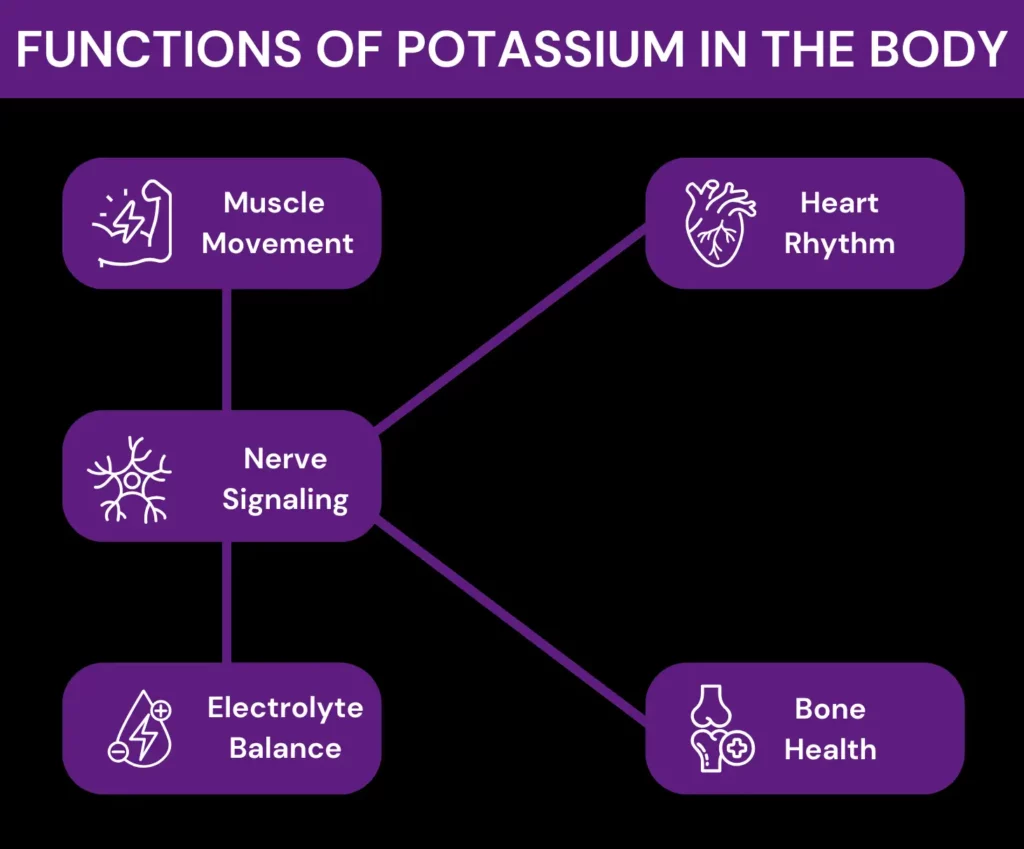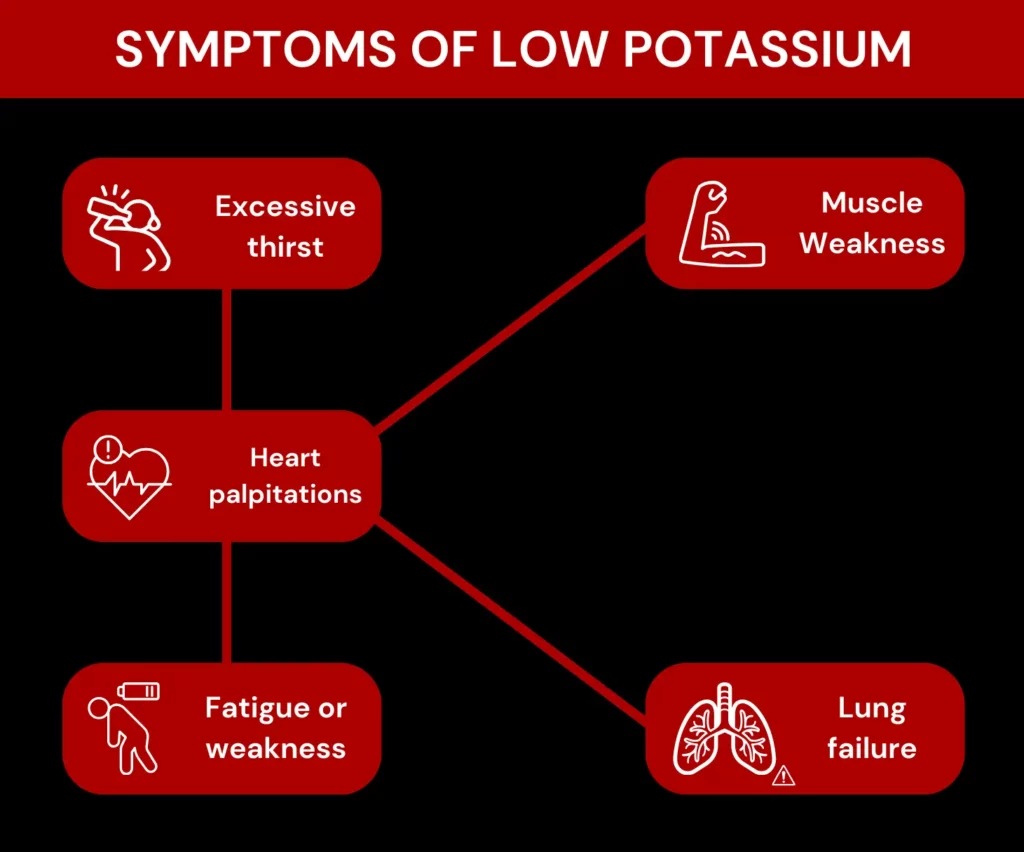Muscle movement, nerve signaling, bone health, electrolyte balance, heart rhythm, and other crucial body functions are affected when you’re low on potassium. Low potassium, or hypokalemia, is a state of dangerously low potassium levels in your blood. Rarely occurring due to a poor diet, hypokalemia often occurs with an underlying disease. Studies have investigated whether low potassium is a sign of cancer. Read on to learn which cancers it may be associated with and how to manage it.

Symptoms Of Low Potassium
The normal range is between 3.6 and 5.2 millimoles per liter(mmol/L), but people with severe hypokalemia have under 2.5 mmol/L of potassium in their blood.
Hypokalemia can lead to symptoms like:
- To replenish potassium, you may feel a lot of thirst, called polydipsia.
- Since potassium regulates your heartbeat, you may occasionally sense palpitations or a skipped heartbeat.
- A disturbed electrolyte balance leads to fatigue and weakness.
- Since muscle movement requires sufficient potassium levels, hypokalemia can lead to muscle damage or spasms.
- Severe hypokalemia could lead to muscle paralysis, which could reach the lungs and cause lung failure.

Is Low Potassium A Sign Of Cancer?
Low potassium levels aren’t a direct indicator of cancer.
However, several kinds of cancer exhibit hypokalemia as a side effect.
Low Potassium And Colon Cancer
Colon cancer can lead to excessive diarrhea, which causes potassium loss over time.
If a tumor forms on or near the colon, potassium absorption from food in the intestines may be impaired.
These conditions can reduce the amount of potassium in your blood, leading to hypokalemia.
McKittrick-Wheelock syndrome is a rare complication of colon cancer that causes severe depletion of electrolytes like potassium.
Low Potassium And Kidney Cancer
One of the most common causes of low potassium levels is mineral loss through urine.
Usually, kidneys filter out potassium from urine, allowing the body to re-absorb it.
Renal cancer often leads to hypomagnesemia, a state of low magnesium in the body.
Since magnesium helps transport and absorb potassium, low magnesium levels can equal low potassium.
Low Potassium And Adrenal Cancer
Aldosterone is a hormone secreted by the adrenal glands that regulates the amount of potassium in your blood.
Primary hyper-aldosteronism is a disease where excess aldosterone is secreted, drastically lowering blood potassium levels.
Some adrenal cancers can cause primary hyperaldosteronism, leading to dangerously low potassium levels.
Low Potassium And Cancer Treatment
Chemotherapy with drugs like cisplatin, cetuximab, eribulin, and ifosfamide can lower potassium levels as a side effect.
They may induce vomiting or diarrhea, further affecting potassium levels.
Anticancer pills or liquids reduce magnesium levels, leading to lowered potassium.
Medications that affect the kidney can prevent proper reabsorption of potassium.
Drugs that cause intestinal inflammation can affect potassium absorption.
Is Low Potassium Genetic?
Low potassium can have genetic links.
Some rare genetic kidney conditions can lead to excessive potassium excretion.
Bartter’s and Gitelman’s syndromes prevent your kidneys from reabsorbing salts.
They are then excreted through the kidney, causing excessive electrolyte losses and hypokalemia or low potassium.
The genes responsible for these diseases are:
| Disease | Causal Gene |
| Bartter’s Syndrome Type I | SLC12A1 |
| Bartter’s Syndrome Type II | KCNJ1 |
| Bartter’s Syndrome Type III | CLCNKB |
| Bartter’s Syndrome Type IV | BSND or CLCNKA & CLCNKB |
| Gitelman’s Syndrome | SLC12A3 and TRPM6 or CLCNKB (rare) |
Both conditions are inherited in an autosomal recessive manner.
You can only develop the condition if both parents carry at least 1 copy of the mutated gene(s).
Other Causes Of Low Potassium
- Digestive causes: Diarrhoea and vomiting due to an infection in the digestive tract could lead to potassium loss.
- Excretory causes: Kidney illnesses (like Liddle’s syndrome or renal acidosis) or diuretic medicines cause the kidneys to excrete excess potassium, leading to hyperkalemia. You can also lose potassium through excessive sweating.
- Dietary causes: Eating disorders or a diet low in potassium could lead to hyperkalemia. Excessive alcohol consumption can also drastically reduce potassium levels.
- As a side effect: Diabetes can increase the amount of ketones in your blood, leading to hypokalemia. Sjogren’s syndrome, an autoimmune disease, also causes hypokalemia.
- Medications: Antibiotics like azithromycin and ceftriaxone have a link to increased potassium loss.
Managing Low Potassium
- Potassium-rich foods include pulses, seeds, nuts, fish, and milk. They don’t contain much sodium, so they are also heart-healthy foods.
- Your doctor may prescribe potassium supplements to treat mild hypokalemia.
- If hypokalemia occurs due to another disease, your doctor will treat you by addressing the underlying cause.
- Severe hypokalemia (that causes arrhythmias and paralysis) needs hospitalization, where you are fed potassium and other electrolytes through an IV tube.
Frequently Asked Questions
Is Low Potassium A Sign Of Kidney Failure?
Hypokalemia or low potassium has a link to kidney failure.
Kidneys can usually filter out potassium and maintain your blood electrolyte levels.
When your kidneys fail, your potassium level drops.
What Organ Is Affected By Low Potassium?
Potassium helps regulate several bodily processes across multiple organ systems.
Low potassium reduces the efficiency of nerve signal transduction, impairing muscle movement.
Impaired muscle movement leads to further complications as hypokalemia worsens.
Can Drinking A Lot Of Water Lower Potassium?
Generally, water consumption has almost no effect on potassium levels.
Theoretically, drinking water can lower potassium levels, but it’s not a safe bet.
The risk of affecting other electrolyte levels is also high, so modifying your diet is best.
Summary: Is Low Potassium A Sign Of Cancer?
Low potassium or hypokalemia can cause thirst, body weakness, and dizziness. In some cases, it can also cause paralysis and heart rhythm disturbances.
While low potassium levels typically do not indicate cancer, some types of cancer, like renal, adrenal, and colorectal cancer, can result in hypokalemia.
If you have concerns regarding low potassium levels or your cancer risk, please consult your doctor.
To maintain healthy potassium levels, eat a potassium-rich diet and consider potassium supplements. In severe cases, you could require hospitalization and be fed potassium through an IV tube.
Others Are Also Reading

Do Tattoos Cause Cancer Like Lymphoma?

The Link Between Vitamin D And Raynaud's Disease

Is Prostate Cancer Hereditary?
References
https://www.tandfonline.com/doi/full/10.1080/20009666.2018.1514943
https://www.mayoclinic.org/symptoms/low-potassium/basics/definition/SYM-20050632?p=1
https://www.mayoclinic.org/symptoms/low-potassium/basics/causes/sym-20050632
https://www.webmd.com/digestive-disorders/hypokalemia
https://my.clevelandclinic.org/health/diseases/17740-low-potassium-levels-in-your-blood-hypokalemia
https://www.medicalnewstoday.com/articles/321735
https://pubmed.ncbi.nlm.nih.gov/35604734
https://medlineplus.gov/ency/article/000479.htm
https://medlineplus.gov/genetics/condition/gitelman-syndrome
https://medlineplus.gov/genetics/condition/bartter-syndrome
https://www.ncbi.nlm.nih.gov/pmc/articles/PMC6204505
https://www.ncbi.nlm.nih.gov/pmc/articles/PMC6521821




